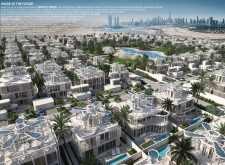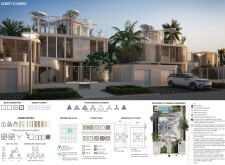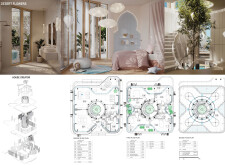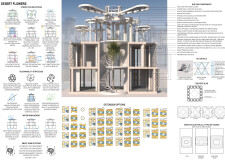5 key facts about this project
## Overview
Located in Dubai, the Desert Flowers project embodies a contemporary architectural approach that integrates innovative design with sustainable living principles. The design reflects the arid desert environment while incorporating advanced technologies, aiming to create a cohesive relationship between urban life and nature. The project serves not only as a residential complex but also as a touchstone of the Emirati cultural identity.
## Spatial Strategy and User Experience
The design emphasizes adaptability in residential spaces, encouraging occupants to personalize their homes while fostering a sense of connection to the community. Central to this concept is a communal garden that symbolizes shared growth and interaction among residents. Each residence is organized around a central atrium, promoting natural ventilation and offering an ecological environment conducive to personal and communal gardening.
## Materiality and Sustainability
The project strategically employs a range of sustainable materials aimed at enhancing durability and aesthetic appeal. Key components include:
- **Glass**: Maximizes natural light while seamlessly connecting indoor and outdoor environments.
- **Recycled PET**: Used in customizable building elements, supporting waste reduction.
- **Concrete**: Provides structural integrity, designed to withstand extreme climatic conditions.
- **Photovoltaic Cells**: Integrated into roofing systems, contributing to energy independence.
- **Composite Panels**: Enhance thermal insulation and allow for creative architectural flexibility.
- **Modular Systems**: Facilitate customization and responsiveness to the evolving needs of residents.
Additionally, the incorporation of a hybrid cooling system and smart home technologies enhances energy efficiency and indoor comfort, merging modern amenities with sustainable practices. Cultural motifs are reinterpreted within the design, linking traditional Arabic influences with contemporary architectural expressions.






















































